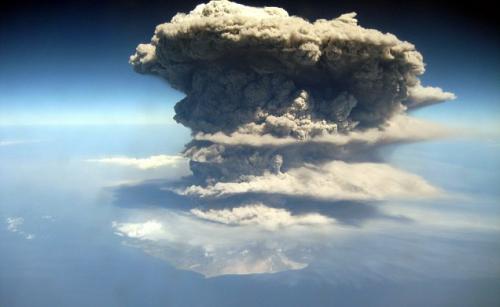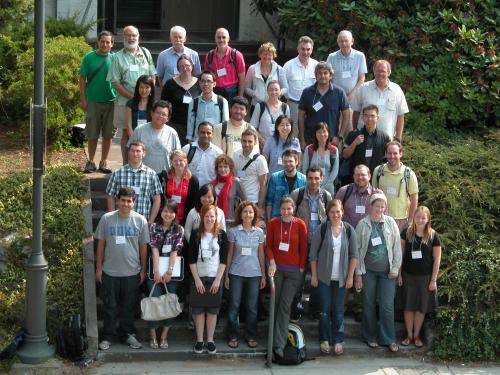Summer School on Computer Models and Geophysical Risk Analysis
Topic
Volcanology, specifically rapid granular flows or pyroclastic flows, provides an excellent scientific motivation and backdrop to investigate the collaborative application of computational models, statistical methods, and risk analysis. Volcanoes prone to pyroclastic events threaten surrounding populated regions and accurate risk analysis of possible future flow events would be of great use for civil protection. Granular flows in this context are governed by a set of nonlinear partial differential equations which are solved over a physical domain provided by a digital elevation map. Simulations of granular flow events tend to be expensive and thus statistical tools to help us chose sets of parameters and initial conditions at which to run the model enable us to utilize computational resources effectively. Finally, computational models allow us to run flow events at realistic but more destructive scenarios (e.g. larger volumes events directed toward locations of interest, i.e., city centers) than those that have already occurred. Additionally, statistical methods allow use to quantify the uncertainty of using computational models to predict damage caused destructive geophysical events.
For realistic risk analysis problems one needs to draw from physical, mathematical, and statistical models. Such models by themselves are often insufficient to capture the complexity of the underlying scientific objective. The summer school is intended to give an overview of general topics – mathematical models, computer models, and their statistical utilization – in the context of geophysical risk analysis, a cutting-edge scientific problem. Our goal is to expose graduate students from mathematics, statistics, and geosciences to the other disciplines and round out their experience with a multidisciplinary problem solving session.
Speakers
Details
Short Course
Date: August 6 and 7, 2010
Jerry Sacks (National Institute of Statistical Sciences) and Will Welch (UBC) will teach a two-day short course on the design and analysis of computer experiments and models. The aim of the short course is to provide the participants with an introduction to cutting edge statistical methods used in computer experiments and model validation and also a common language for the next stages of the Summer School.
Topics to be covered:
- Random Function Models
- Designs
- Data Adaptive Random Function Model/Assessment of
- Accuracy
- Detailed Example
- Visualization
Day 1
1. INTRODUCTION
Background; history; examples
2. RANDOM FUNCTIONS (RFMs)
Approximation of code output via random function description of input-output relationship Bayesian connections
3. DESIGNS
Covering input space for good approximation
Choice of sample size
4. UNCERTAINTY
Approximation error through uncertainty in random function prediction
Estimation of parameters of random function models
5. USES OF RFMs
Sensitivity analysis
Answering what if questions
Optimization via RFM predictions
==================================
Day 2 (conclude by noon)
6. RECAP OF DAY 1 VIA A CASE STUDY
7. CALIBRATION AND VALIDATION
Formulation and structure for assessing validity
Tolerance intervals (uncertainty of prediction)
Confounding of calibration/tuning with validation
8. OPEN ISSUES
Additional Information
Registration
If you are a student (local / foreign) who does not need financial support, you can still attend the Summer School. Please sign up for the Summer School by following the register link at the bottom of the page. When you are done with registration, a SIGN UP button will appear. Click the button and you will be redirected to the page where you are asked to pay the registration fee by credit card. The registration fee is $56.
Please help PIMS plan for future events by filling out this (quick and painless!) evaluation survey.
Financial Support
A limited amount of financial support (i.e. travel and accommodation) is available for young researchers and graduate students. Deadline for the application of financial support has passed and we no longer accept applications at this stage. Selected students will receive an offer before June 30, 2010. Only successful applicants will be contacted.
Student Accommodation:
Students will be provided a standard single room with single bed in a six-bedroom apartment at the Gage Residence on the UBC campus (5959 Student Union Blvd., Vancouver, BC) for arrival on Thursday, August 5th, and departing on Wednesday, August 11th. For further information regarding check-in procedure and facilities, please obtain a copy of Gage Info- Individual.pdf from the Downloads section above. A UBC campus map is also available there. Gage Residence is located in north-east corner painted in orange colour on the map. Note that you will be provided breakfast on the morinings of Aug 6-10. You can obtain the breakfast tickets at the check-in front desk. Please contact Ken Leung (kleung@pims.math.ca) should you have any questions on your accommodation.
Note: A detailed UBC Campus Map with all building names is also available to download.
Please also visit the official web site at: http://www.stat.duke.edu/research/projects/frog/events.htm

Photo credit: metro.co.uk
Photograph:

Participants of the Summer Schol on Computer Models and Geophysical Risk Analysison Computer Models and Geophysical Risk Analysis
MJ Susie Bayarri (University of Valencia)
Roger Beckie (University of British Columbia)
James O Berger (Duke University)
Eliza S Calder (University of Buffalo)
Johannes Gemmrich
(University of Victoria)
Mark Jellinek (University of British Columbia)
Abani K Patra (University of Buffalo)
Bruce Pitman (University of Buffalo)
Robert L Wolpert (Duke University)
*Jerome Sacks (National Institute of Statistical Sciences)
Elaine Spiller (Marquette University)
*William Welch (University of British Columbia)
Note for '*': short course instructor (see course description below)

